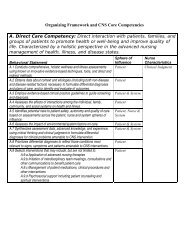Physician
Medicare Physician Guide - National Association of Clinical Nurse ...
Medicare Physician Guide - National Association of Clinical Nurse ...
- No tags were found...
Create successful ePaper yourself
Turn your PDF publications into a flip-book with our unique Google optimized e-Paper software.
For purposes of examination, the following organ systems are recognized:<br />
Constitutional (e.g., vital signs, general appearance)<br />
Eyes<br />
Ears, nose, mouth, and throat<br />
Cardiovascular<br />
Respiratory<br />
Gastrointestinal<br />
Genitourinary<br />
Musculoskeletal<br />
Skin<br />
Neurologic<br />
Psychiatric<br />
Hematologic/lymphatic/immunologic<br />
The extent of examinations performed and documented is dependent upon clinical<br />
judgment and the nature of the presenting problem(s). They range from limited<br />
examinations of single body areas to general multi-system or complete single organ<br />
system examinations.<br />
DG: Specific abnormal and relevant negative findings of the examination of the<br />
affected or symptomatic body area(s) or organ system(s) should be documented.<br />
A notation of "abnormal” without elaboration is insufficient.<br />
DG: Abnormal or unexpected findings of the examination of the unaffected or<br />
asymptomatic body area(s) or organ system(s) should be described.<br />
DG: A brief statement or notation indicating "negative" or "normal" is sufficient to<br />
document normal findings related to unaffected area(s) or asymptomatic organ<br />
system(s).<br />
DG: The medical record for a general multi-system examination should include<br />
findings about 8 or more of the 12 organ systems.<br />
10<br />
Medicare <strong>Physician</strong> Guide: A Resource for Residents, Practicing <strong>Physician</strong>s and Other Health Care Professionals 107





